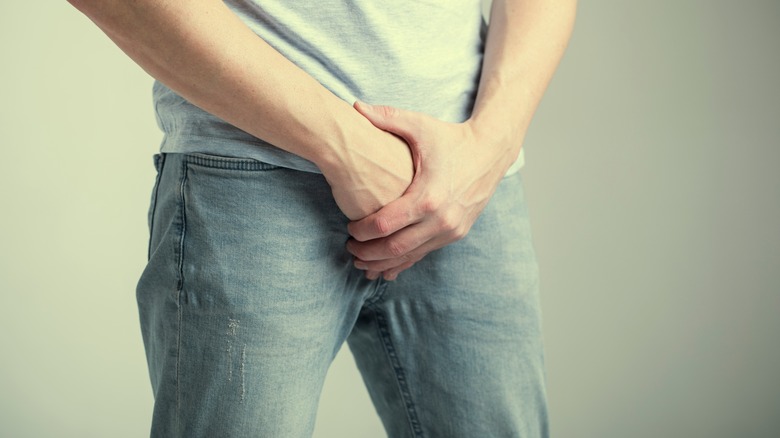Sneaky Reasons Your Bladder Isn't Emptying All The Way
When you go to the bathroom to pee, it should feel like your bladder has completely emptied. However, this may not always be the case. Some people have frequent urination while others have trouble peeing. The latter is specifically called urinary retention, it's a condition that is the inability to completely empty your bladder and can be caused by many different things, according to Cleveland Clinic. It can happen to both men and women.
Your pee can reveal surprising things about your health, especially if the feeling of having to pee doesn't go away. There are some groups of people who deal with urinary retention more than others. It is more common in the elderly and men are significantly more likely to have the condition than women, according to the National Institute of Diabetes and Digestive and Kidney Diseases (NIDDK). Urinary retention is primarily characterized by the feeling of having to pee and being unable to or being able to pee but your bladder never feels empty. It can be caused by a number of sneaky reasons.
Medication side effects may affect bladder emptying
The bladder will store urine so that peeing is a controlled process. When someone tries to pee, the bladder muscles will contract, pushing the urine out, while two valves open to let the urine escape, according to WebMD. There are certain medications that can cause urinary retention. These drugs, as a side effect, change how the bladder muscles work and can interrupt this process, according to Cleveland Clinic. Think back to when your urinary retention started. Have you had it for a long time or has it only recently begun after starting a new prescription or buying an over-the-counter drug at the pharmacy?
These medications can include antidepressants, opiates, antipsychotics, muscle relaxants, and even more common drugs like antihistamines which are used to treat allergies. If urinary retention began after starting an over-the-counter medication and prescription, talk to your doctor about potentially switching medications. Never stop taking a prescription without the consent of your doctor.
A blockage may be preventing you from peeing
Because urine is stored by the bladder and then travels through the urethra to exit the body, any blockage can prevent or slow down the flow of urine, according to Livestrong. The most common way for this to happen is if a male has an enlarged prostate. Why a prostate becomes enlarged is not currently known, but the most common explanation is that it's due to hormonal changes, according to the U.K. National Health Service. An enlarged prostate can obstruct the urethra. It may not be voluntary, but holding in your pee is risky.
For women, a fallen bladder may be the cause of a blockage. Specifically called cystocele, the condition is caused when the ligaments and muscles that hold the bladder up, between the vagina and bladder, become stretched or weakened, according to Cleveland Clinic. Usually caused by childbirth or general strain on the pelvic muscles, cystocele can force the urethra into certain angles creating a blockage.
Nerve issues can prevent normal signals between the bladder and brain
When you need to pee, the bladder will tighten to force urine out. This happens because your brain sends a signal to your bladder to contract and then sends another signal to your sphincter muscles to relax. This combination lets urine flow out of the body, according to Cleveland Clinic. It stands to reason that anything that interrupts this signal path between the brain and bladder and urethra can cause urinary retention.
There are many causes for this type of nerve issue, such as stroke, diabetes, multiple sclerosis, and childbirth (per Cleveland Clinic). People with catheters may also be at a greater risk for nerve issues. Traumatic injuries that involve the brain, spine, or pelvis can also lead to nerve problems that interrupt signals to the bladder, according to Livestrong. Because of the slightly random nature of getting a nerve issue, men and women have equal chances of getting urinary retention in this way.
Surgery may cause urinary retention
Surgery is a common cause of urinary retention. Specifically, it's the medication provided before and during surgery that is the culprit of urinary retention. During the surgery, patients will often be treated with intravenous (IV) fluid that replaces water, salts, and sugars you may lose during surgery, according to Healthline. This can cause a full bladder. Combined with anesthesia given to patients, which prevents any feeling in a localized area so there is little to no pain, this can prevent you from feeling like you need to pee, according to NIDDK.
Thankfully, if you are experiencing urinary retention after surgery, there is little reason to worry. It's a very common side effect of surgery that should disappear once the anesthesia wears off and you can feel the need to pee again, according to Livestrong. Not all surgeries will cause urinary retention, however. The most common procedures to cause urinary retention are hip replacements and spinal, pelvic, and rectal surgeries, as well as hemorrhoid removal, according to Cleveland Clinic.
You're simply getting older
There are many side effects to getting older and one of them is a weakened bladder. It's certainly not uncommon for the muscle to become weaker as you age which can make it more difficult to have full squeezes that help you urinate fully, explains the NIDDK. As you age, many muscles will lose mass and weaken, according to the National Institute on Aging. This is due to the body becoming more resistant to normal muscle growth signals sent by the brain, according to Healthline.
Muscle decline does not begin to decline late into life. It can start as early as age 30, with most people losing 3% to 5% of their muscle mass every decade, according to Harvard Health. Thankfully, there are things you can do to help keep your bladder strong through the decades, including urinating after sex, keeping a healthy weight, exercising regularly, and doing pelvic floor muscle exercises, according to the National Institute on Aging.






